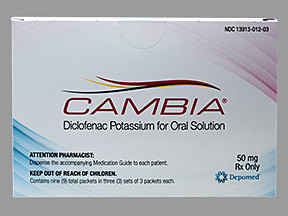DICLOFENAC POWDER PACKETS - ORAL
PHONETIC PRONUNCIATION: (dye-KLOE-fen-ak)
COMMON BRAND NAME(S): Cambia
GENERIC NAME(S): diclofenac potassium
Uses
USES: Diclofenac is used to relieve pain from various conditions. This form of diclofenac is used to treat migraine headaches. Diclofenac is a nonsteroidal anti-inflammatory drug (NSAID). It works by blocking your body's production of certain natural substances that cause inflammation. This effect helps to decrease swelling, pain, or fever.
How to use DICLOFENAC POWDER PACKETS - ORAL
HOW TO USE: Read the Medication Guide provided by your pharmacist before you start taking diclofenac and each time you get a refill. If you have any questions, ask your doctor or pharmacist. Take this medication by mouth as directed by your doctor. Empty the contents of one packet into a cup containing 1 to 2 ounces (30 to 60 milliliters) of water. Mix well and drink all of it right away. Do not mix with any liquid other than water. If stomach upset occurs while taking this medication, take it with food, milk, or an antacid. However, if you take this medication with a meal high in fat, it may not work as well. There are different brands and forms of this medication available. Because different forms do not have the same effects at equal strengths, do not switch forms of diclofenac unless your doctor tells you to. To reduce your risk of stomach bleeding and other side effects, take this medication at the lowest effective dose. Do not increase your dose or take it more often than prescribed. Pain medications work best if they are used as the first signs of pain occur. If you wait until the pain has worsened, the medication may not work as well. If you are using drugs for migraine attacks on 10 or more days each month, the drugs may actually make your headaches worse (medication overuse headache). Do not use medications more often or for longer than directed. Tell your doctor if you need to use this medication more often, or if the medication is not working as well, or if your headaches get worse.
Side Effects
Precautions
Interactions
Overdose
Images
Reviews
Warning
WARNING: Nonsteroidal anti-inflammatory drugs (including diclofenac) may rarely increase the risk for a heart attack or stroke. This effect can happen at any time while taking this drug but is more likely if you take it for a long time. The risk may be greater if you have heart disease or increased risk for heart disease (for example, due to smoking, family history of heart disease, or conditions such as high blood pressure or diabetes). Do not take this drug right before or after heart bypass surgery (CABG). This drug may rarely cause serious (rarely fatal) bleeding from the stomach or intestines. This effect can occur without warning at any time while taking this drug. Older adults may be at higher risk for this effect. (See also Precautions and Drug Interactions sections.) Stop taking diclofenac and get medical help right away if you notice any of the following rare but serious side effects: bloody or black/tarry stools, persistent stomach/abdominal pain, vomit that looks like coffee grounds, chest/jaw/left arm pain, shortness of breath, unusual sweating, confusion, weakness on one side of the body, slurred speech, sudden vision changes. Talk with your doctor or pharmacist about the risks and benefits of treatment with this medication.
Disclaimer
IMPORTANT: HOW TO USE THIS INFORMATION: This is a summary and does NOT have all possible information about this product. This information does not assure that this product is safe, effective, or appropriate for you. This information is not individual medical advice and does not substitute for the advice of your health care professional. Always ask your health care professional for complete information about this product and your specific health needs.


No Reviews Yet